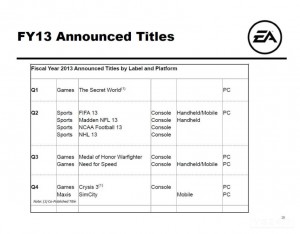Majesco Entertainment’s E3 2012 lineup
Posted on 13 years ago by Brian(@NE_Brian) in General Nintendo, News | 0 comments
The first E3 2012 lineup is in.
Majesco Entertainment’s showing consists of just two games this year. The company will be bringing NBA Baller Beats (Kinect) to the show as well as the next entry in the Zumba Fitness franchise.
Majesco says that the new Zumba Fitness game will be “an exhilarating new experience.” It launches this fall. Platforms haven’t been confirmed, but the IP has previously landed on the Wii, PlayStation 3, and Xbox 360.
Not the most exciting E3 lineup, but this is a sign that the expo is fast approaching!
Source: Majesco Entertainment PR
n-Space on Heroes of Ruin, future 3DS support, Wii U more
Posted on 13 years ago by Brian(@NE_Brian) in 3DS, General Nintendo, News, Videos, Wii U | 0 comments
Yet another interview from iDÉAME 2012. n-Space’s Roberto García Lago talks Heroes of Ruin, RollerCoaster Tycoon 3D, what it’s like working with Square Enix, Wii U, and more. There was also an indication that n-Space will make more games for the 3DS if Heroes of Ruin sells well.
Nomura interested in HD versions of Kingdom Hearts I/II, return to consoles, more
Posted on 13 years ago by Brian(@NE_Brian) in 3DS, General Nintendo, News | 0 comments
Kingdom Hearts hasn’t been on a console in a long time. Square Enix has been making portable spinoffs for a number of years, though this might be changing soon.
In an interview with Game Informer, Tetsuya Nomura expressed interest in returning to consoles. While answering a question about a possible PlayStation Vita title, Nomura said, “I also feel that it’s about time that Kingdom Hearts should go back to being on a console.”
Nomura was later asked about HD versions of Kingdom Hearts I and II. Regarding this, he told the magazine:
“I do have an interest in HD versions, and I’m currently researching them. If it is possible, I would like to do something about the series being spread over so many different consoles, too. I am thinking a lot about the future.”
Last but not least, Nomura wasn’t able to confirm if the next Kingdom Hearts title will be KHIII, but he did say that fans “may be able to find a hint if you play through Dream Drop Distance to the very end.”
According to Nomura:
“I’m not able to disclose any information on what’s coming next or any other future plans, but you may be able to find a hint if you play through Dream Drop Distance to the very end.”
EA’s product lineup includes Need for Speed, new Dead Space on the way
Posted on 13 years ago by Brian(@NE_Brian) in General Nintendo, News | 0 comments

EA has posted its fiscal year 2013 product lineup in its latest financial report. Need for Speed is included in the list and is scheduled for Q3.
A new Dead Space title is coming soon, too. Although EA mentioned it during an investors call, the publisher did not specify any details. The company would only say, “There’s no further information today but watch for several big product announcements from EA at E3 in June.”
Sonic & All-Stars Racing Transformed concept art
Posted on 13 years ago by Brian(@NE_Brian) in 3DS, General Nintendo, News | 0 comments
ValueError thrown
Path cannot be empty